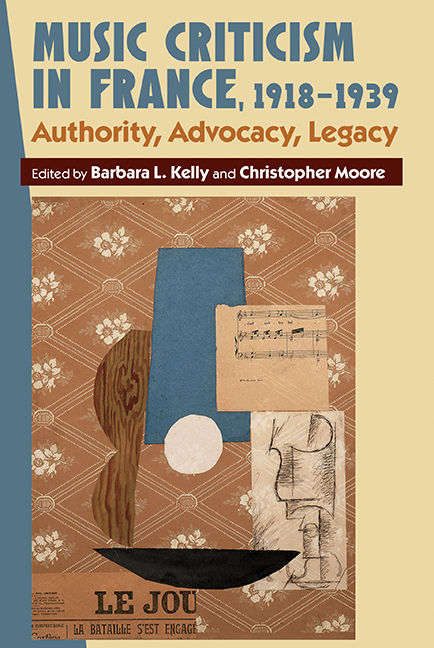Book contents
- Frontmatter
- Contents
- List of Figures
- List of Tables
- List of Contributors
- Acknowledgements
- Introduction: The Role of Criticism in Interwar Musical Culture
- 1 Music Criticism and Aesthetics During the Interwar Period: Fewer Crimes and More Punishments
- 2 Nostalgia and Violence in the Music Criticism of L'Action française
- 3 Charles Koechlin: The Figure of the Expert
- 4 Bleu-horizon Politics and Music for Radio Listeners: L'Initiation à la musique (1935)
- 5 Common Canon, Conflicting Ideologies: Music Criticism in Performance in Interwar France
- 6 Arthur Honegger: Music Critic for Musique et Théâtre (1925–1926)
- 7 A Woman's Critical Voice: Nadia Boulanger and Le Monde musical, 1919–1923
- 8 From a Foreign Correspondent: The Parisian Chronicles of Alejo Carpentier
- 9 Debussy's ‘Reputational Entrepreneurs’: Vuillermoz, Koechlin, Laloy and Vallas
- 10 The Legacy of War: Conceptualising Wartime Musical Life in the Post-War Musical Press, 1919–1920
- 11 Satie, Relâche and the Critics: Controversies and Legacy
- 12 Creating a Canon: émile Vuillermoz's Musiques d'aujourd'hui and French Musical Modernity
- Selected Bibliography
- Index
8 - From a Foreign Correspondent: The Parisian Chronicles of Alejo Carpentier
Published online by Cambridge University Press: 17 July 2019
- Frontmatter
- Contents
- List of Figures
- List of Tables
- List of Contributors
- Acknowledgements
- Introduction: The Role of Criticism in Interwar Musical Culture
- 1 Music Criticism and Aesthetics During the Interwar Period: Fewer Crimes and More Punishments
- 2 Nostalgia and Violence in the Music Criticism of L'Action française
- 3 Charles Koechlin: The Figure of the Expert
- 4 Bleu-horizon Politics and Music for Radio Listeners: L'Initiation à la musique (1935)
- 5 Common Canon, Conflicting Ideologies: Music Criticism in Performance in Interwar France
- 6 Arthur Honegger: Music Critic for Musique et Théâtre (1925–1926)
- 7 A Woman's Critical Voice: Nadia Boulanger and Le Monde musical, 1919–1923
- 8 From a Foreign Correspondent: The Parisian Chronicles of Alejo Carpentier
- 9 Debussy's ‘Reputational Entrepreneurs’: Vuillermoz, Koechlin, Laloy and Vallas
- 10 The Legacy of War: Conceptualising Wartime Musical Life in the Post-War Musical Press, 1919–1920
- 11 Satie, Relâche and the Critics: Controversies and Legacy
- 12 Creating a Canon: émile Vuillermoz's Musiques d'aujourd'hui and French Musical Modernity
- Selected Bibliography
- Index
Summary
While critical debates in the French musical press reflected the spirit of innovation that characterised Parisian musical life during the interwar years when commentators sought to assess the recent past in relation to contemporary trends, new French music and the activities of the Parisian avant-garde provided a potent model for advocacy of the progressive in Latin America, notably Cuba. Among the most influential figures asserting such advocacy was the Cuban writer Alejo Carpentier (1904–80). His music criticism of the interwar period promoted European modernism, in particular new music from Paris, not only as a means of countering the entrenched conservatism of contemporary concert life in Havana, but also as a metaphor for the struggle for political and ideological freedom that was part of his quest to engender a new Latin American identity at a time when the Cuban regime was becoming increasingly oppressive and more than pandering to creeping US imperialism. This essay explores Carpentier's music criticism of the interwar years against a background of his musical involvements and political activities, and considers how, and why, his writings about the Parisian musical milieu were intended to inform and influence the Latin American vanguardia for whom Paris was the centre of European refinement and culture.
Although Carpentier is best known for his novels and essays exploring his seminal concept of ‘the marvellous real’, an idea that lit the fuse that led to the explosion of Latin American literature often described as ‘El boom’, he began his literary apprenticeship writing music criticism. Developing his own aesthetic ideals through his commentaries on the work of the Paris-based composers he most admired, Carpentier later drew on music both as a structural device and narrative theme in his literary writing. While El reino de este mundo (The Kingdom of this World, 1949) juxtaposes musical references to underpin confrontations between African-originated and European traditions during the Haitian Revolution, Los pasos perdidos (The Lost Steps, 1953) concerns a composer's quest for creative rediscovery on a journey in space and time to the depths of the South American jungle. Specific musical works trigger chains of involuntary memories, similar to the effect of Vinteuil's Sonata in Proust, both in Los pasos perdidos and El acoso (Manhunt, 1956); the latter, like El siglo de las luces (Explosion in a Cathedral, 1962), is also supposedly constructed according to the principles of sonata form.
- Type
- Chapter
- Information
- Music Criticism in France, 1918–1939Authority, Advocacy, Legacy, pp. 193 - 218Publisher: Boydell & BrewerPrint publication year: 2018



